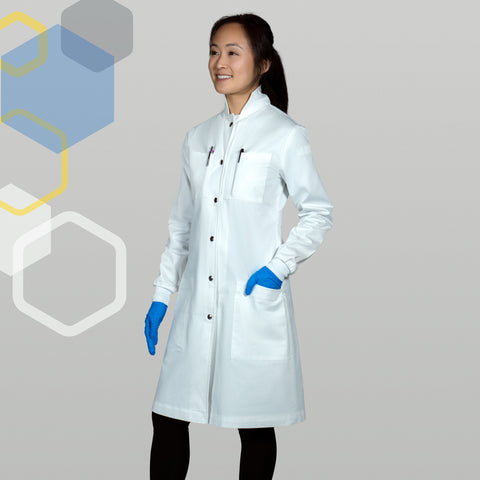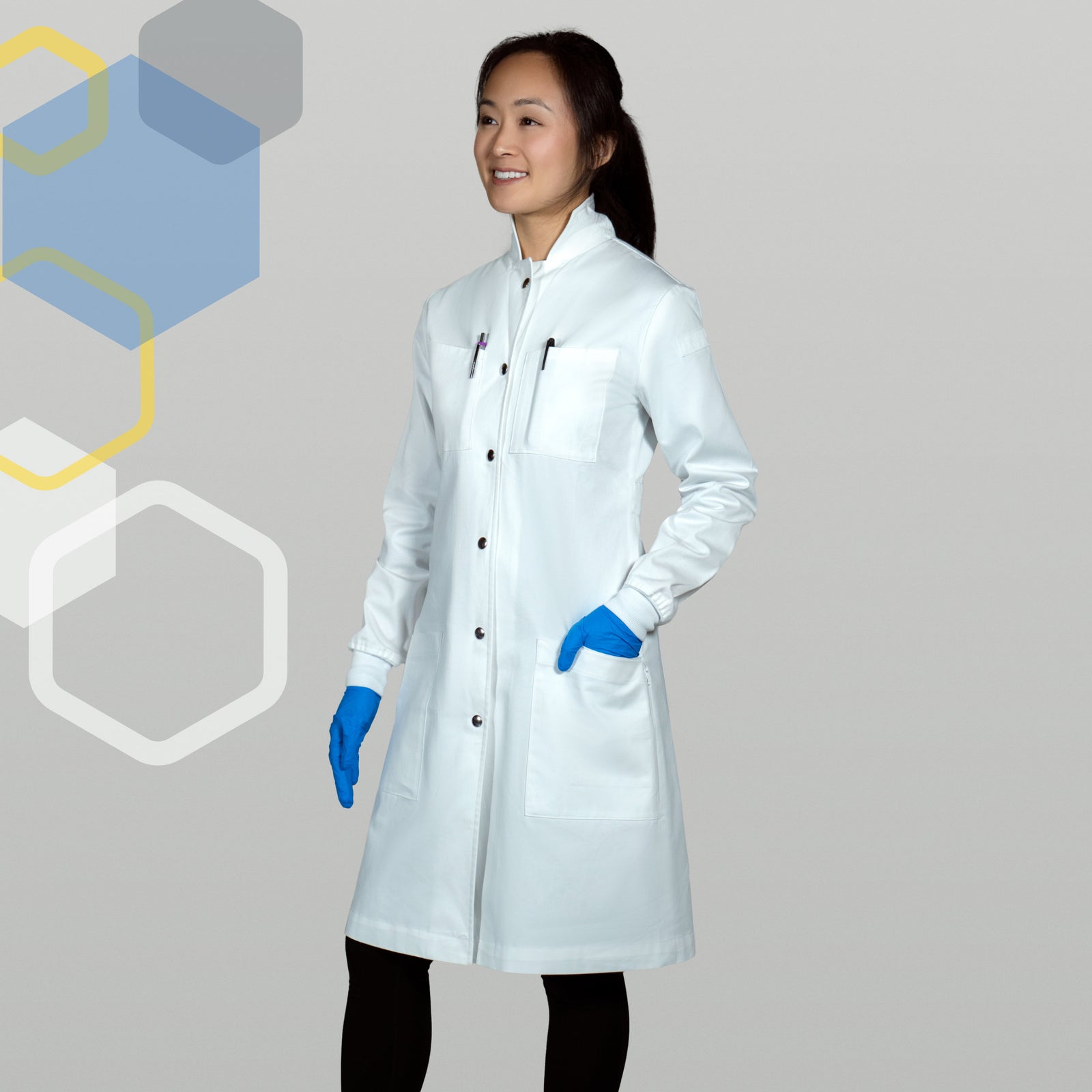Your Cart is Empty
Menu

Best Lab Coats for Scientists (2026)
10 min read
Last updated: January 19th, 2026
We surveyed over 1500 scientists to learn what they love and hate about their lab coats from every brand. It seems like every lab coat has at least one annoying quirk to know before buying. Here are some things to watch out for:
What to look for in a lab coat for research:
Not every brand is high quality, and many brands sell a range of high-end to low-end. For example, the specs could be identical online but when you get it, you notice the fabric is stiff, thin, and the stitching is bad. We're here to help!
Understanding the material you're buying
For a deep dive on lab coat materials, we have an Ultimate Guide to Lab Coat Materials that includes 100% cotton, FR-treated cotton, Nomex, polyester, polycotton blends, and a few others. Basically:
- 100% cotton or FR-treated cotton is best around flames, but wear an apron and butyl gloves when handling acids (acids will eat through these)
- Don't EVER use 65% or higher polyester content around heat, flames, or flammable materials. It can melt to your skin and trap you inside!
- Polyester-based lab coats are good fluid barriers in biological labs and around acids where heat and flames are not present
- Nomex is the best overall material for hazardous chemistry, but these usually cost over $200
Each of these materials needs washed and cleaned a certain way. See our guide on How to Wash and Clean Your Lab Coat for more details.
Features made for Scientists vs. Doctors (Research vs. Healthcare)
Many scientists are unknowingly wearing lab coats designed for doctors! In the best-case, these will slow you down in your lab work. Worst-case, you can get seriously injured while wearing these in an accident!
We have a short article about The Differences Between Scientist Lab Coats and Doctor's Lab Coats to explain everything you need to know. But here's the short list of what to look for in a lab coat for scientific research:
- All-metal snaps in the front to remove it quickly in a fire or spill
(more details on snaps vs buttons preference here) - Ribbed knit cuffs to keep your wrists protected from chemicals
(more details on knit cuffs here) - Fabric content that contains cotton or is 100% cotton
(when working around heat or flames; more details on lab coat materials here) - A collar that snaps all the way up to the base of your neck
("Howie" style; more details on the Howie style collar here)
Special considerations for women buying lab coats:
The data showed us that women with curvy, plus-sized, or petite body types have the hardest time finding a good fit, and their direct quotes show that these problems can negatively affect how they feel at work, and even their motivations for continuing scientific research.

For some women in STEM-specific tips for buying lab coats, we wrote a short article explaining what to look for if you're curvy, plus-sized, or petite.
The best lab coats for each type of scientist:
You can spend hours searching through hundreds of options. Finding one that’s both comfortable and safe can be difficult. Whether you're a chemist, biologist, doctor, student, or even just looking for a Halloween costume, the list below will help you choose the ideal lab coat for your needs.
Here are the best lab coats for each use case: (click to jump)
- Best 100% Cotton Lab Coats for Chemistry Students
- Best Chemistry Lab Coats for Research
- Best Biology Lab Coats
- Best Lab Coats for Clinical Research
- Best Colorful Lab Coats
- Best Halloween Scientist Lab Coat
- The Lab Coat Project - Help us design it!
*Please consult your institution’s lab coat recommendations for your line of work. Choosing the wrong lab coat can be dangerous. This list is meant to be a general guide and we cannot be sure these are suitable for your research environment.
Best 100 Percent Cotton Lab Coat for Chemistry Students
When you're getting started in your first college chemistry lab freshman year, the typical requirement is a 100% cotton lab coat. (Double-check this yourself!) This is because you experiment with Bunsen burners and exothermic chemical reactions that can start fires.
100 percent cotton will burn slowly, but it disintegrates as it burns. Polyester, which is the common (and lower-price) alternative will actually melt to your skin, and can trap you inside!
Here's a 5-minute YouTube video we made about choosing chemistry lab coats:
The Lab Coat Project - 100% Cotton Lab Coat for Scientists
We were a little frustrated with all the "doctor"-focused options out there, so after gathering feedback from over 1500 scientists, we designed, tested, and launched our own.
With strong metal snaps, long knit cuffs, a convertible up/down collar, more pockets than any other lab coat and even an adjustable belt to give you some shape, we really think this currently the best lab coat for general chemistry lab classes ever made.
After 2 years of development and testing, these are now in stock and ready to ship. Visit The Lab Coat Project page here to see more details.
You can also purchase these from us on our Amazon Store Page.
Dr. James Unisex White 100% Cotton Lab Coat, Classic Fit
A solid all-around chemistry lab coat for students is this Dr. James 100% cotton one, easily ordered on Amazon, although it has some shortcomings.
We love that it uses metal snaps, which helps you get out fast in a fire. It also has an extra phone pocket and is pretty soft to the touch (we tested this one ourselves). The fabric feels a bit heavy, but the cotton keeps it breathable.
For chemistry labs, it would be better to have long knit cuffs for wrist protection and an extra button to cover your neck in the case of intense chemical reactions. It's also "unisex", which means you may have to size up if one part of your body is much wider than the rest.
Best Chemistry Lab Coats for Research
Workrite™ FR/CP™ Lab Coat
Chemists usually work with hazardous chemicals and lab coats serve as their primary armor. It should protect their chest and arms from harmful chemicals. If you’re looking for top-notch protection, this one from Workrite is the perfect fit for you. It's sometimes available on Amazon and can be difficult to locate for direct purchase online elsewhere. Try Thomas Scientific if you can't get it on Amazon.
The Workrite FR/CP Lab Coat is a top-of-the-line lab coat for chemists working with dangerous chemicals. It’s a multi-hazard lab coat that’s flame-resistant as well as liquid chemical splash resistant, thanks to its heavy Nomex IIIA fabric. With a chest pocket, two lower flap-snap closure pockets, plus splash-resistant pass-throughs for easy inner pocket access, it’s got all the pockets you would normally expect. Industry-leading protection doesn’t come cheap, and this lab coat usually costs over $130.
Check the price here and make sure you find the listing with the correct size.
Red Kap’s Unisex Specialized Cuffed Lab Coat
Red Kap’s Lab Coat is a much cheaper alternative but still provides helpful tight knit cuffs for less hazardous wet chemical work. Made with 80% polyester and 20% combed cotton, it’s within the recommended minimum of 65% polyester for a chemical research lab setting but not suitable for working with flammable materials. Definitely do not use this around Bunsen burners, strong oxidzers or hot plates!
Chemists will definitely like the knit cuffs that this lab coat offers, which keep sleeves out of the way while working, and the extra back coverage, which protects against dirty working surfaces. It comes with a standard chest pocket and two lower pockets, plus has the ability to be buttoned all the way up to protect your neck. The fabric is a little bit stiff so it might not be as comfortable as higher quality fabrics.
Check the price on Amazon.
Best Biology Lab Coats (Life sciences)
Worklon Lab Coat with Convertible Collar
The Worklon Lab Coat is ideal for biologists who place a high priority on comfort as well as durability and functionality. The easy-to-clean 80% polyester and 20% cotton mix is ideal for professionals who deal with spills, splashes, and other messes on a regular basis but it’s not a good choice for working with flammable materials.
This coat has a professional appearance yet allows for plenty of movement, making it easy to layer over outfits. It includes polyester knit cuffs, a convertible collar, and side slits for pocket access to add safety and accessibility. The 41" length for a medium might be a little long for those who consider themselves stocky or short and curvy.
Check the price here.
Fisherbrand™ Unisex Lab Coats With Knit Cuffs
Thermo Fisher Scientific's Fisherbrand™ Unisex Lab Coats with Knit Cuffs are made of 65/35 Polycotton, perfect for handling biological materials and less hazardous flammables. It features knit wrist cuffs that give a comfortable and secure fit. Higher cotton content (35%) gives extra comfort and breathability, so you won't get as hot in the summer. The lab coat is also designed with the standard one left breast pocket and two lower pockets. For $21, it’s a cheap lab coat that may provide the same durability as other choices.
Check the price here.
Best Lab Coats for Clinical Research
Medelita Premium Lab Coat
For the modern medical or dental practitioner who doesn’t need to worry about chemicals or flammables, Medelita produces stylish and functional lab coats but for a premium price. This one, in particular, is around $110. Lab coats from Medelita are designed to withstand regular wear and tear as well as laundering.
It’s made of a polyester and cotton blend fabric that is breathable and soft while also being durable for long-term use. It has more storage space than usual lab coats with a chest pocket, two lower pockets (one has a tablet pocket, and a left interior pocket. It also features pant-access hand vents, a back center vent, and performance fabric with a soft-hand feel. These lab coats feel more like a suit and should only be used in clinical settings.
Check the price here.
Adar Universal Unisex Lab Coats
Since 1971, Adar Medical Uniforms has been a well-known name in the medical uniforms market. They provide quality, comfort, and fashionable styling options for those working in the medical field. These are quality lab coats, but designed more generically for healthcare. There are three pockets on the outside that sit higher than other lab coats and one pocket inside for extra storage. You can also access the pockets of your pants underneath through a hole on the side but it’s small and you might find yourself struggling to fit your hands.
The material isn’t thin or stiff like other lab coats and that makes it more durable and comfortable. It also has large buttons on the front to easily take on or off when you’re in a hurry. If a white lab coat isn’t your thing, you have tons of color options, like burgundy, royal blue, and even khaki.
Check the price on Amazon.
Best Colorful Lab Coats
TAILOR'S Personalized Customizable Embroidered Men's Lab Coat
In science and research the word "fashion-forward" isn't one that comes to mind very often. This is mirrored in lab coats, which are the most visible symbol of science. Most lab coats are just white, plain, and boring. TAILOR'S Personalized Customizable Embroidered Men's Lab Coat has 18 different colors you can choose from.
The embroidered text placed on the left chest can be customizable where you can choose from a variety of fonts and print colors. It’s made of a 65/35 polycotton combination that features the standard two patch pockets and a chest pocket as well as a vented back. The fabric is lighter in weight and may feel cheap for some users and the sizes also tend to run larger than expected.
Check the price on Amazon.
Workwear Revolution Tech Men & Women Lab Coats
This lab coat from Cherokee has different color options to choose from that can help you show your creativity at work. It’s made up of 78% polyester, 20% rayon, and 2% spandex that features fitted wrist cuffs and a snap closure that reaches up to the neck.
For storage, it has the usual two patch pockets, a chest pocket, and a bonus pen slot. It also comes with additional features such as antibacterial and fluid resistance, but is not suitable for working with flammables. We tried this one on and found it very loose and "flowy" with shorter than average sleeves. If that's your thing, then you'll love it.
Check the price on Amazon.
Best Halloween Scientist Lab Coat
Natural Uniforms’ Unisex Lab Coat
If you’re looking for a lab coat as a Halloween costume, your best option is something sturdy but cheap. Natural Uniforms’ Unisex Lab Coat is less than $20 and a decent quality material but noticeably thinner and more breathable than more expensive lab coats. It’s soft and comfortable and comes with numerous features. It has a belted back for a tapered fit, a lapel collar, front button closure, one chest pocket, and two lower pockets that will add flair to your costume. As expected with less expensive lab coats, the fitting and color can be different than expected.
Check the price on Amazon.
VOGRYE Professional Lab Coat
Vogrye’s Professional Lab Coat is a popular choice on Amazon, it’s cheap and perfect for a Halloween costume. For a price as low as $16, you’ll get a decent lab coat with imperfections here and there as you would normally expect for cheap materials. The fabric is thin and the size doesn’t fit perfectly but will still make you look like the scientist or doctor you’re aiming for this Halloween.
Check the price on Amazon.
Not satisfied with the selection here?
After 2 years of development and testing, these are now in stock and ready to ship. Visit The Lab Coat Project page here to see more details of our new design!
Need more info on choosing a lab coat?
Here's a list of our related articles for more info:
- Ultimate Guide to Lab Coat Materials
- How to clean and wash lab coats for research
- Differences Between Scientist and Doctor's Lab Coats
- Ribbed knit cuffs vs. straight cuffs for lab coats
-
Plus-sized and Petite Lab Coats: Fit and Buying Guide
- Survey Says: Snaps Beat Buttons 3-to-1 in Lab Coat Preference
-
Why the Howie Collar Might Just Save Your Neck
- Do Lab Coats Have to Be White?
- 3 Reasons Why Scientists Asked for a Black Lab Coat
Author
Derek Miller, Ph.D.,
Materials Scientist and founder of Genius Lab Gear
Lab Coat Guides
Stay up to date
Drop your email to receive new product launches, subscriber-only discounts and helpful new STEM resources.
Disclosure
As an Amazon Associate I earn from qualifying purchases.
Lab Coats designed by scientists
Our lab coats were designed from the feedback of over 1000 scientists as a part of The Lab Coat Project. It's a crowdsourced design specifically for scientific research, especially general chemistry, organic chemistry and microbiology labs, with high-end features at an affordable price.

The Ultimate Lab Coat Guide: 5 Types Every Scientist Should Know
5 min read
After spending three years researching lab coats and surveying over 1,500 scientists in what I call "The Lab Coat Project," I've discovered something troubling: most of us are wearing the wrong lab coat. Let me break down the five major classes of lab coats you'll encounter, so you can make an informed decision that keeps you safe and comfortable in the lab.

Do Lab Coats Have to Be White?
4 min read
Ever wondered why lab coats are white? Discover the surprising history behind the iconic garment and why today’s scientists might wear more than just white in the lab.
GET UPDATES ON NEW LAB COAT DESIGNS
Drop your email to be notified when new lab coat designs are released, plus our monthly resource newsletter.

























